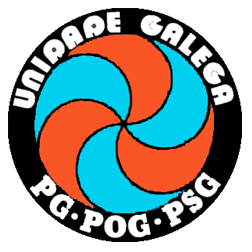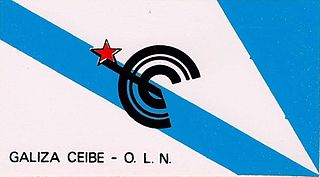
The Galician Nationalist Bloc is a political alliance of left-wing Galician nationalist parties. It is self-defined as a "patriotic front".
Galician Workers' Party was a political party in Galicia, Spain.
The Galician People's Union is a Galician nationalist and communist political party, and is one of the registered political parties of Spain. The party publishes the magazine Terra e Tempo, and the secretary general is Néstor Rego.
The Galician People's Front is a Galician political organization with a socialist and independentist ideology.

Galician nationalism is a form of nationalism found mostly in Galicia, which asserts that Galicians are a nation and that promotes the cultural unity of Galicians. The political movement referred to as modern Galician nationalism was born at the beginning of the twentieth century from the idea of Galicianism.

Galician Unity was a Galician nationalist and social democratic political coalition formed by the Galician Workers Party, Galician Socialist Party, and the Galicianist Party in 1979.
Unidade por Narón is a municipal, independent, galician nationalist and progresist political party.

Emilio Pérez Touriño is a Spanish politician and economist. He is the former secretary general of the Socialists' Party of Galicia and, from August 2005 to March 2009, former president of the autonomous community of Galicia (Spain). Namely, he was president of the executive branch, the Xunta de Galicia. His political views are social democratic and Galicianist.

The 2012 Galician regional election was held on Sunday, 21 October 2012, to elect the 9th Parliament of the autonomous community of Galicia. All 75 seats in the Parliament were up for election. The election was held simultaneously with a regional election in the Basque Country.

Galiza Ceibe-OLN was an independentist and socialist political party in Galicia, Spain. Galiza Ceibe was founded on 1980 by the Galician Party of the Proletariat as a political and electoral front, originally to present a list in Vigo and in other galician municipalities under the name Agrupación Electoral Galicia Ceibe in the 1979 local elections.

The Galician Socialist Party–Galician Left was a Galician nationalist and left-wing party of Galiza.

Commitment to Galicia is a Galician political party with a Galician nationalist, progressive and social-democratic ideology.

Acción Galega is a Galician political organization led by former the former member of the PP Rafael Cuíña, former Galician autonomic Minister Teresa Táboas and the former senator of the Galician Nationalist Bloc (BNG) Xosé Manuel Perez Bouza. The party was founded in 2012 through the union of several parties of centrist and moderate Galician nationalist ideology: the Partido Galeguista Demócrata, the Galician Nationalist Party-Galicianist Party, Terra Galega and Galician Coalition.

The Partido Galeguista Demócrata is a Galician centrist political party that claims to be the ideological heir of the Partido Galeguista. Until 2011 its name was Partido Galeguista.

The Galician Nationalist Party–Galicianist Party is a Galician nationalist and liberal political party, coming from a split of the Galician Coalition. The PNG–PG had 132 members in 2002. Xosé Mosquera Casero is its secretary general, after the VIII Congress in September 2011.
Mocidades Galeguistas or, also used until 1989, Mocidades Nacionalistas Galegas is a political youth organization of Galicia, with a Galician nationalist and social liberal ideology. The organization defends a liberal Galicia in a federal Spain.
Galician Nationalist Convergence was a political coalition and, later, a political party in Galicia formed by Galician Coalition and Centrists of Galicia. CNG presented lists to the local elections of 1991. After the 1991 elections Centrist of Galicia abandoned the coalition and entered the People's Party of Galicia. This, and the bad electoral results, caused a crisis in Galician Coalition, which led to the split of CNG in the provinces of Ourense and Lugo. CNG, now an independent party, presented lists in the local elections of 1995, gaining only the 0.59% of the vote. The disastrous results of the local elections of 1999 led to the dissolution of the party and the founding of Galician Initiative.

Galician Coalition is a political party in Galiza with a Galician nationalist and centrist ideology. Since 2012 CG is part of the coalition Compromiso por Galicia.
Galician Unity was a Galician nationalist and democratic socialist party formed by the Galician Socialist Party-Galician Left (PSG-EG) in 1991.
Galician Progressive Coalition was a centre-right Galician political coalition formed for the municipal elections of 1987.











